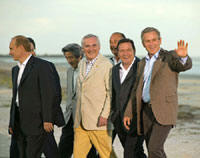|
||||
NEPAD and G8 Meet to Advance Africa's Agricultural Development AgendaAfrican representatives met with those from eight leading countries of the industrialized world (Japan, Russia, UK, France, Italy, Germany, USA, and Canada), known as the 'G8', in Bamako, Mali during March 15-18 to identify early actions to accelerate agricultural progress in Africa. The discussions centered around ways to jump-start NEPAD's Comprehensive Africa Agricultural Development Programme (CAADP). The meeting was convened by ECOWAS (The Economic Community Of West African States) with assistance from the NEPAD Secretariat; and from USAID representing the G8 countries. More than 200 participants attended, including senior staff from NEPAD, ECOWAS, FARA, CORAF, The World Bank, The African Development Bank, USAID, civil Society, NARS, NGOs and the CGIAR. Dr. Saidou Koala represented the Desert Margins Program and ICRISAT. CAADP sets specific targets for achievement by the year 2015, including 6 percent annual production growth particularly benefiting small-scale farmers and women; integrating farmers into a continent-wide, dynamic market economy and exporting into world markets; achieving an equitable distribution of wealth; gaining strategic position in agricultural science and technology; and fostering environmentally-sound, sustainable agricultural development. The discussions were lively. Early actions identified by the meeting are:
The participants want to have concrete action plans on the table for the NEPAD Heads of State who will meet on April 20-22 in Accra, Ghana. Such actions need to be implemented and show impact within the following twelve months. Drafting teams are now busy writing up short concept notes involving multiple partners. ICRISAT and the DMP for example are working with CIMMYT, ICRAF, IFPRI, IITA, IWMI and WARDA to develop several concept notes on small-scale irrigation, fruit tree, and seed systems development. About NEPAD
The Steering Committee of NEPAD comprises the Personal Representatives of the NEPAD Heads of State and Government. This Committee oversees projects and program development. About the G8
On the margins of the 2001 Genoa Summit, G8 Leaders met with several African Leaders who introduced the New African Initiative (now known as the New Partnership for Africa's Development). G8 Leaders gave their support to this initiative by designating personal representatives to follow up the process. The G8 Africa Action Plan was adopted at the Kananaskis G8 Summit on June 27, 2002. The Action Plan helped define a new partnership between G8 countries and those of Africa and set out specific commitments in support of NEPAD. |
||||
|

 The
New Partnership for Africa’s Development (
The
New Partnership for Africa’s Development ( The
The